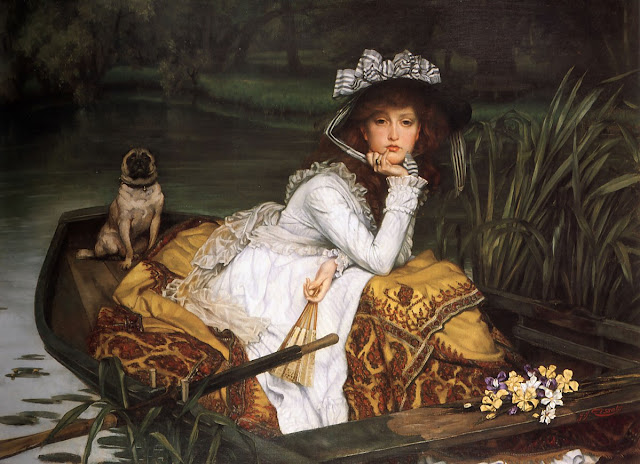They say a picture is worth a thousand words - and, in all honesty, the cover of this old Oxford World's Classics edition of Madame Bovary may tell you all you need to know about the book. Let's have some fun and do a pictorial book review by discussing this painting as if it really were an interpretive key to the book. It's a bit unconventional, but so was Flaubert.
This woman provides a fairly good representation of Emma Bovary's character - that perfect expression of petulant boredom, the attitude of indolence, the love of finery and ornament. Emma was a woman who read too many bad novels - a bit of a fantasist, if we're honest. The real world held no charms for her. She wanted high romance, excitement, and an elegance out of the reach of her bourgeois country doctor husband.
 |
| Young Lady in a Boat by James Tissot, 1870 |
Zooming out to consider the painting as a whole makes the scene a bit clearer for us. The lady is adrift in a boat, the paddle lying idle at her side. She makes no effort to steer a course, and appears to have run into the weeds. She's oblivious to the beauty of the world around her, instead directing her gaze into the artist's own, wishing to see her own beauty reflected there. She is posed and she is staged, gazing into the Mirror of Narcissus that is the artist's artificially constructed image of her. And what of the little pug dog in the boat? There is Charles Bovary, Emma's stolid and faithful lapdog, proud to be with her, always behind her, and completely beneath her notice. The wildflowers in the boat lay plucked and discarded, useful only for a moment's pleasure or as an ornament to the woman's own beauty. They echo Waterhouse's painting of Ophelia, and the whole scene foreshadows his Lady of Shalott. Both allusions are apropos.
I have mixed feelings about Madame Bovary. Stylistically, it is a work of French 19th century realism or naturalism, and Flaubert's style is engaging (as much as I can say that having only read an English translation), though it drifts into the sordid. Emma is not a particularly sympathetic character (she is meant to be flawed). Her wicked behavior and self-absorption aren't played for laughs like Becky Sharp in Vanity Fair. The reader suffers watching Emma Bovary, witnessing many painful scenes of ugly behavior and bad decisions. Do we pity her or judge her? What does this say about us? We may hope for her redemption, but Flaubert doesn't provide us with an easy ending to the book.
This is only the second work I've read by Flaubert, having read the short story "A Simple Heart" many years ago. Though I appreciate his talent as a writer, he isn't a favorite.
Read for Classics Club Spin #40
